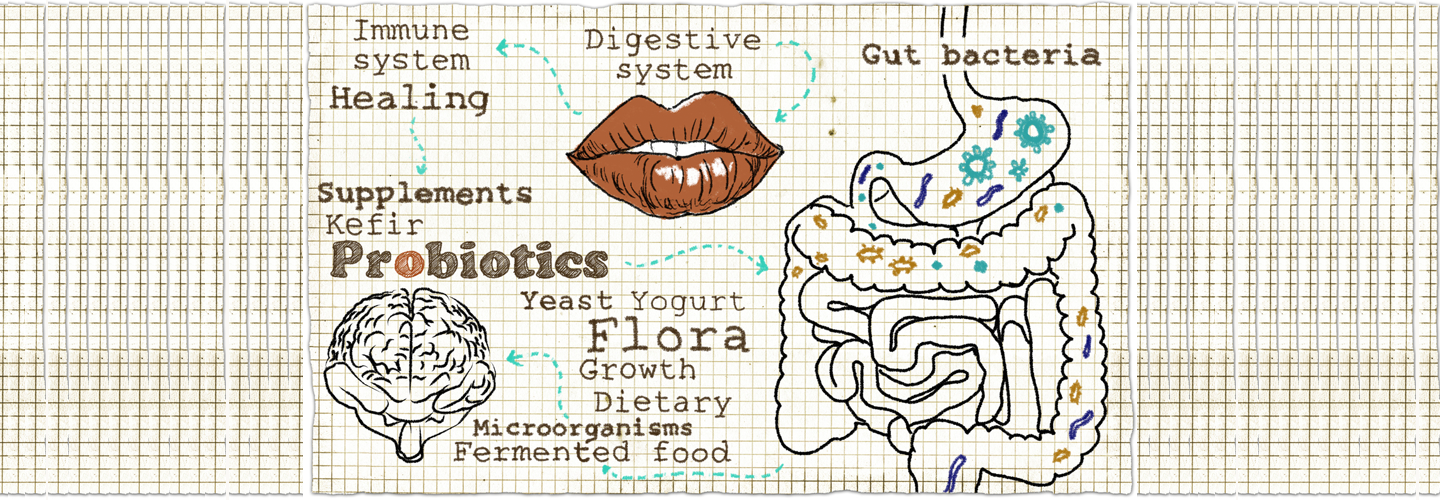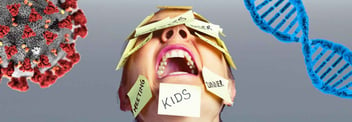Psychobiotics and Your Microbiome – It’s a Gut Feeling
- Home
- Blog

Researchers have coined the term “psychobiotics” to describe probiotics (live bacteria and yeasts that are good for your health, especially your digestive system) that produce mental health benefits. Some authors would also include prebiotics, which enhance the growth of these health-promoting organisms, as having psychobiotic properties.[i] Studies involving the “microbiome” – the hundred trillion (100,000,000,000,000!) bacteria and other microbes in your body that mostly reside in your gut – are all the rage in cutting edge medical research. From the 1990s to present day, scientists have managed to unravel links between gut bacteria and numerous health conditions including: arthritis, cancer, diabetes, fibromyalgia, multiple sclerosis, and obesity. Today, the emerging field of human microbiome research is also demonstrating that gut bacteria may play an important role in brain development, behavior, and mood in humans. Furthermore, these bacteria are also being explored, and sometimes used, as treatments for anxiety and depression, reducing stress, and improving overall mood.
The Gut-Brain-Axis
Did you know that your body contains “two brains?” The familiar one (the one you are using to read this blog!) is in your central nervous system – but there is also “second brain” – the enteric nervous system (ENS). Both can be involved in determining emotional health or illness.[ii] The ENS is a part of the nervous system located within and controlling the functions of your gastrointestinal system. The relationship between your gut and brain is bidirectional. Many of us can all relate to having a queasy stomach and feeling emotionally stressed before a big presentation, on our wedding day, or when anticipating a visit with family members who seem to thrive on “high drama.” At these time of psychological stress, certain brain-related pathways will actually alter the composition of the bacteria contained within your gut.[iii] On the other hand, depleting healthy bacteria from your gut may alter a number of neurochemical processes within your brain, thereby altering your mood.[iv]
There are several main pathways by which signals travel from the gut through the body and cross the blood-brain barrier. Some of those core pathways include the ENS, the vagus nerve (connecting the brain and gut), the immune system and hormones within the gut. Communications between these entities regulate several important functions, including immunity, digestion, metabolism, satiety, and stress reactions.[v]
Dysbiosis (Unhealthy Gut)
If one’s body has an unbalanced gut microbiome containing too few or unbalanced probiotics and prebiotics it is known as “dysbiosis.” This can happen when a person consumes a nutritionally unbalanced diet, has taken antibiotics that have killed off many probiotics in the gut, has been exposed to toxins, and/or isn’t doing a good job managing life stress. The body’s intestinal lining may become too porous, a condition called leaky gut, which creates chronic inflammation in the body and eventually may precipitate or contribute to a series of autoimmune diseases and mood disorders too.[vi]
Gut Bacteria and Mental Health
It turns out that bacteria have the capacity to generate many neurotransmitters and neuromodulators found in the brain, like GABA, norepinephrine, dopamine, and acetylcholine. They can deliver these neuroactive substances to the brain via the gut-brain axis. Dysfunction in the gut-brain axis and disruptions to gut health have been linked to psychiatric conditions like anxiety, depression, autism spectrum disorder, schizophrenia and neurodegenerative disorders.[vii] Some microbes are capable of producing serotonin. Taking Bifidobacterium infantis as a probiotic, for example, alters levels of serotonin—just like Prozac.[viii] Dark chocolate acts as a prebiotic, enhancing the growth of bacteria called Lactobacillus and Bifidobacterium which help improve mood.
Probiotics for Your Mood
Probiotics such as Bifidobacterium and Lactobacillus have demonstrated a number of helpful effects for mood regulation.[ix] You can find these bacteria in many foods, particularly the fermented ones (one of my favorites is Bubbies Pickles). These health-promoting bacteria can be found in such items as: yogurt, cheese, Kefir, Buttermilk, sausage, cured meats, wine, vinegar, sauerkraut and sourdough bread.
Now that we know that gut bacteria can influence our brain function, and that the brain influences the composition of our gut bacteria, the next challenge for scientists is to more effectively control this communication to bring about greater health benefits, to both prevent as well as help to cure many chronic diseases. The science of psychobiotics explores emerging strategies for encouraging the growth of brain-altering bacteria in the gut to provide mental health benefits Perhaps as the world of microbiome-based medicine expands, we may find that psychobiotics will be used instead of, or to augment the effectiveness of, many common antidepressants; and that custom “psychobiotic cocktails” will be just another tool for promoting psychological well-being.
For further information, feel free to download our mini-book, Build Yourself a Healthier Brain>.
Related Information
- Learn about Genetic Testing
- Learn about Potomac Psychiatry
- Meet Our Doctors
- Contact Potomac Psychiatry


